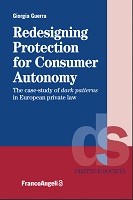Redesigning Protection for Consumer Autonomy
The case-study of dark patterns in European private law
Abstract
European legal protection of consumer autonomy has been significantly changed in the digital environment, where algorithm-driven systems perform everything. This book focuses on protecting consumer autonomy facing the pervasive and global phenomenon of dark patterns: the expression includes various tactics that manipulate consumers by altering online choice architecture to thwart user preferences for objectionable ends. Overloading, skipping, stirring, hindering, and flicking are examples. Moving from the perspective that the sole traditional information approach is ineffective in protecting autonomy, the adopted methodology considers the multiple concerns revolving around the tight combination of transparent information and fair digital architectural design. Consequently, the comparative study of the new suitable regulatory directions arises across different legal fields, including data protection, consumer, and competition law. The relationship between deceptive designs, the nature of human-digital architecture interaction, and the techno-legal paradigms emphasises which future changes in European private law could integrate legal rules into fair designs to protect digital consumer autonomy effectively. Specific importance will be attributed to the functionality of comparative methodology to include non-legal essential insights (e.g. behavioural, informatic elements) into pragmatic and global regulatory paths and models.
Keywords
European private law, Consumer law, Data protection law, Autonomy, Dark Patterns, Digital law, Design regulationISBN
9788835154839Publisher
FrancoAngeliPublisher website
https://www.francoangeli.it/Home.aspxPublication date and place
Milan, 2023Classification
Private or civil law: general
Consumer protection law
Data protection law


 Download
Download Web Shop
Web Shop